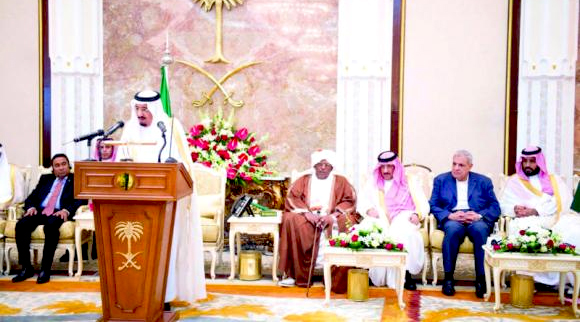Mina, Sep 26: The Kingdom will continue to play its role at the regional and international level for Arab and Muslim unity and will not allow anyone to drive a wedge between them or disrupt the harmony, said Custodian of the Two Holy Mosques King Salman on Friday.
He was speaking at an annual reception in Mina in honor of the leaders of Islamic countries and other dignitaries. The king said Saudi Arabia is working in tandem with brotherly countries for unity and stability in the Muslim and Arab world.
Islam is the religion of peace, compassion, justice and charity, he said. "Our religion preaches goodness and we have learned from our beloved Prophet (peace be upon him) that the best people are those who use their hands and tongues to benefit others and treat them well." He said a Muslim is the one who doesn't harm other Muslims by his hand or tongue and we adhere to this guidance while praying Allah Almighty to help and guide us. He said Allah Almighty has honored us by providing the opportunity to serve the House of God (Kaaba) and the pilgrims. The leadership and people of the Kingdom exert all efforts to make the journey and stay of the guests of Allah as stress-free as possible and to ensure their security and safety, the king said.
The king prayed to Allah Almighty to free the Ummah of all ills, strengthen the Arab and Islamic world with security and stability. He also prayed for world peace. “I pray to Allah that the worship of all those who attended Haj be accepted and that they be purged of their sins... It is also my prayer that all pilgrims return to their families safely...”
Earlier, Haj Minister Bandar Hajjar congratulated King Salman on the occasion of Eid Al-Adha.
The minister also congratulated pilgrims for performing the Haj rituals in peace and comfort. He thanked Crown Prince Mohammed bin Naif, Makkah Gov.Prince Khaled Al-Faisal and Madinah Gov. Prince Faisal bin Salman for their sincere efforts in serving the pilgrims.
Head of Muslim World League Abdullah bin Abdulmuhsin Al-Turki said Muslims are following with pain and sorrow the situation unfolding in the Islamic and Arab countries which are witnessing strife, chaos, poverty and unemployment.
These countries are pinning great hopes on Custodian of the Two Holy Mosques to bring them out of these crises, Al-Turki said.







Comments
Add new comment